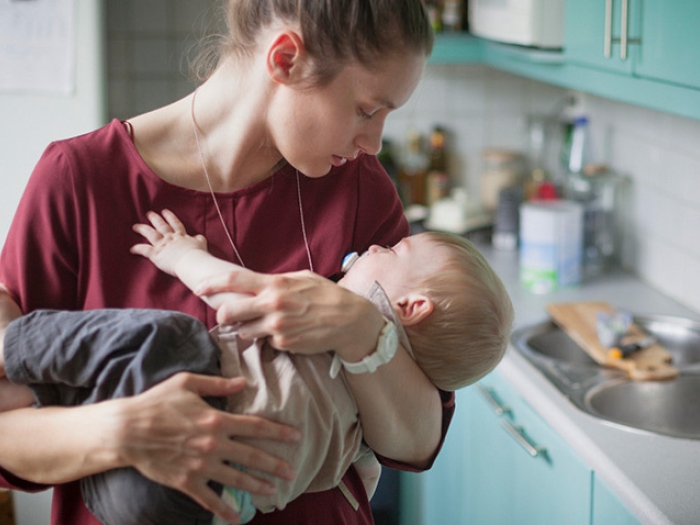A new study finds that babies with spina bifida have early symptoms of sleep-disordered breathing that could contribute to lifelong issues with neurodevelopment.
7:00 AM
Author |

New parents often hear about how important sleep is for their babies' development — but some newborns may have more serious sleep challenges than others.
MORE FROM THE LAB: Subscribe to our weekly newsletter
A research team at the University of Michigan C.S. Mott Children's Hospital and Michigan Medicine is studying infants at the highest risk of sleep disorders, including those with chronic illnesses. The team's latest research focuses on newborns with spina bifida, which is the most common permanently disabling birth defect in the U.S.
All 20 babies in the study had myelomeningocele, the most serious form of spina bifida, and each was diagnosed with sleep-disordered breathing (SDB) right after birth, according to the team's findings published in the Journal of Pediatrics. SDB, which includes conditions like sleep apnea, can prevent children from having healthy sleep critical to their growth, learning and behavior.
"Our team is studying high-risk patient populations to see how often and how early we can identify a sleep disorder," says lead author Renée Shellhaas, M.D., M.S., a pediatric neurologist at Mott.
"In our small study of newborns with the most serious form of spina bifida, every infant had sleep-disordered breathing in the first days of life. This means we may have early and important opportunities to provide sleep interventions that may have a real impact on these children's general health and their development."
"These are patients for whom neurodevelopmental challenges are expected," Shellhaas adds. "Early intervention may make a lifelong difference in neurodevelopment."
The earlier we can identify these conditions, the more likely we are to find interventions that may make a difference long term.Renée Shellhaas, M.D., M.S.
The effect of fetal intervention
Spina bifida involves a defect of the backbone and spinal cord that prevents spinal bones from fusing together as they should as a fetus grows. These patients are more vulnerable to sleep problems because of several factors, including that the defect is associated with an abnormality in the brain stem affecting a baby's breathing, Shellhaas says.
SEE ALSO: Are Doctors Overmedicating Newborns with Seizures?
Many are also born premature, which is another risk factor for a SDB.
Michigan Medicine is among a select group of hospitals in the country that offers surgery to partially correct the malformation while the fetus is still inside the mother. The research team assessed both babies with the fetal intervention and without, and found both groups were equally as likely to be diagnosed with SDB.
Babies with spina bifida were also much more likely to have these disorders than other premature babies being treated in a neonatal intensive care unit.
Shellhaas says further studies will track the children as they grow to monitor delays in gross motor, fine motor, problem solving and social development. She says because of Michigan Medicine's Fetal Diagnosis and Treatment Center and Sleep Disorders Centers, the institution is well-positioned to make an impact for babies most likely to suffer from sleep disorders.
"We are among a very few programs with the ability to take on this specific type of research. We think that gaining a better understanding of newborn sleep may be incredibly meaningful for families who are impacted by significant illnesses in their infants," she says.
"We see neurodevelopmental consequences in older children who are missing out on healthy, restful sleep. Abnormal sleep can have an impact on behavior, attention and learning. The earlier we can identify these conditions, the more likely we are to find interventions that may make a difference long term."

Explore a variety of health care news & stories by visiting the Health Lab home page for more articles.

Department of Communication at Michigan Medicine
Want top health & research news weekly? Sign up for Health Lab’s newsletters today!





